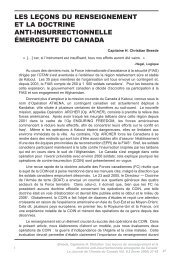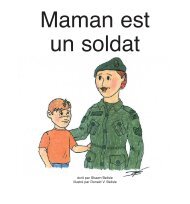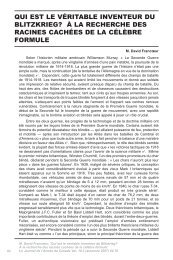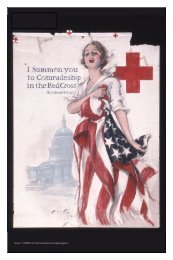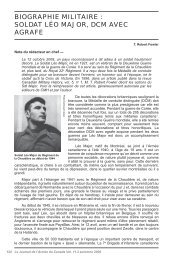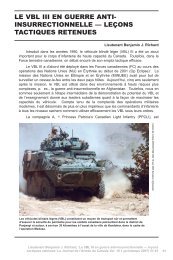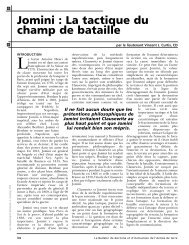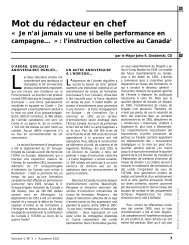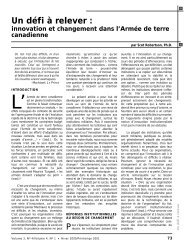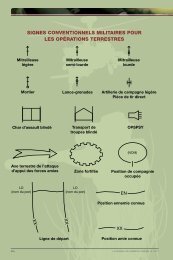The Canadian Army Journal
The Canadian Army Journal
The Canadian Army Journal
Create successful ePaper yourself
Turn your PDF publications into a flip-book with our unique Google optimized e-Paper software.
superiority of numbers to overcome any invader. In that regard, a story reported in the<br />
press in the early post Mao period quoted Chairman Mao as saying that if the United<br />
States were to kill 500 million Chinese, China would have another 500 million to put<br />
forward.<br />
<strong>The</strong> death of Mao in 1976 and Deng Xiaoping’s consolidation of power in 1978<br />
brought major changes to the PLA’s mission, doctrines and training—a transformation<br />
that is likely to go on for at least another decade. If being “red” is not completely out,<br />
being “expert” is definitely on the ascendant. Professionalization has included the<br />
restoration of ranks, regulations for promotions with technical skills as the criterion,<br />
mandatory retirement, elaboration of functionally specialized military career paths,<br />
elaboration of a military education system, and promulgation of a National Defence Law<br />
to codify military responsibilities and processes. All these developments are described<br />
by Professor Lyman Miller of the U.S. Naval Postgraduate School in Monterey,<br />
California.<br />
<strong>The</strong> political commissar, an institution unique to communist societies, is the object<br />
of You Ji’s attention, a political scientist. Under the rule of President Jiang Zemin (1989-<br />
2003), the function of the political commissar has evolved considerably. It was originally<br />
intended to enforce control of the party over the gun. Under Jiang, it has evolved in<br />
different directions. Party secretaries are now concurrently political commissars. <strong>The</strong>ir<br />
role is to enhance PLA interests in local affairs, promote popular awareness of national<br />
defence in society, and to address a concern that increasingly, political leaders have little<br />
or no experience in military affairs. Otherwise, commissars interfere minimally in military<br />
affairs—a development in line with the professionalization and depoliticization of the<br />
military.<br />
Thomas Bickford, a senior analyst at the CNA Corporation, focuses on the reform of<br />
the military education system for officers. <strong>The</strong> shift from ideological indoctrination to<br />
technical expertise has required major changes in the educational infrastructure of the<br />
PLA. Military academies, curricula, teaching methods, new requirements for instructors,<br />
have all had to be reviewed to put officers through a formation that responds to the new<br />
reality. In an unprecedented move, the PLA is now looking at collaboration with civilian<br />
universities in various areas, including engineering. Numbers and size are out; quality<br />
and efficiency are in. <strong>The</strong> opening of the PLA to new approaches includes sending<br />
officers abroad and offering scholarships to talented students.<br />
Further exploring the cooperation between the civilian and military education<br />
systems, Kristen A. Gunness looks at the various initiatives the PLA has drafted and<br />
implemented to produce highly qualified officers. <strong>The</strong>se initiatives include recruitment<br />
incentives for gifted students, distinct educational programs for the military at civilian<br />
universities, the hiring of technical experts as faculty, and research partnerships between<br />
military academies and civilian universities. As a result of these initiatives, Gunness, also<br />
a senior analyst at the CNA Corporation, reports that as of May 2004 there were 15,000<br />
national defence students enrolled in engineering and information technology (IT)<br />
programs.<br />
Defence expenditures have occupied much of the Western media’s attention in the<br />
last few years and for good reason. While the military share of the national budget<br />
remained fairly low between Mao’s death in 1976 and 1988, the rise in defence<br />
expenditures in the 1990s averaged 15.9%. Much of these additional funds went to<br />
improving salaries for the military. Professor Joseph Fewsmith’s concern, however, is<br />
with the likely future constraints on defence spending. He estimates that the military, like<br />
any other constituency, will have to fight to obtain its share of the national budget.<br />
Fewsmith, a political scientist at Boston University, calculates that this spending is likely<br />
to decrease over time as a share of national expenditures. He attributes this future trend<br />
to another major concern of the government: building a welfare state, including<br />
<strong>Canadian</strong> <strong>Army</strong> <strong>Journal</strong> Vol. 11.1 Spring 2008<br />
131


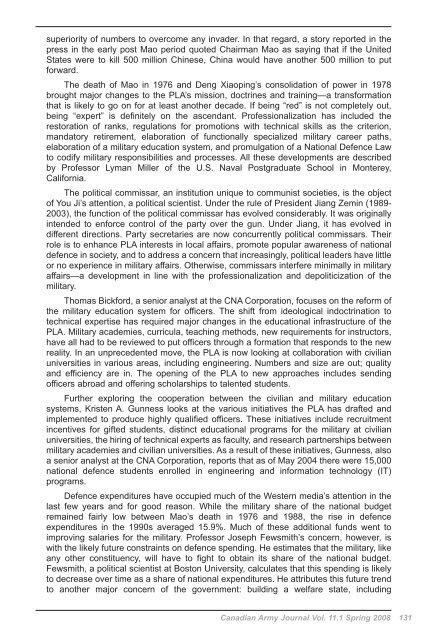
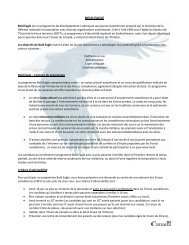
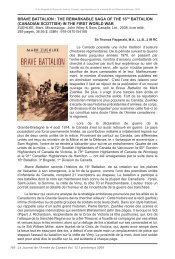
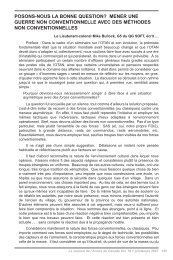
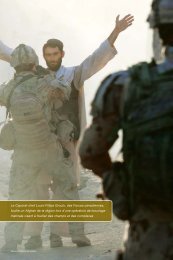
![La modularite dans l'Armee de terre canadienne [pdf 1.6 MB]](https://img.yumpu.com/17197737/1/188x260/la-modularite-dans-larmee-de-terre-canadienne-pdf-16-mb.jpg?quality=85)
